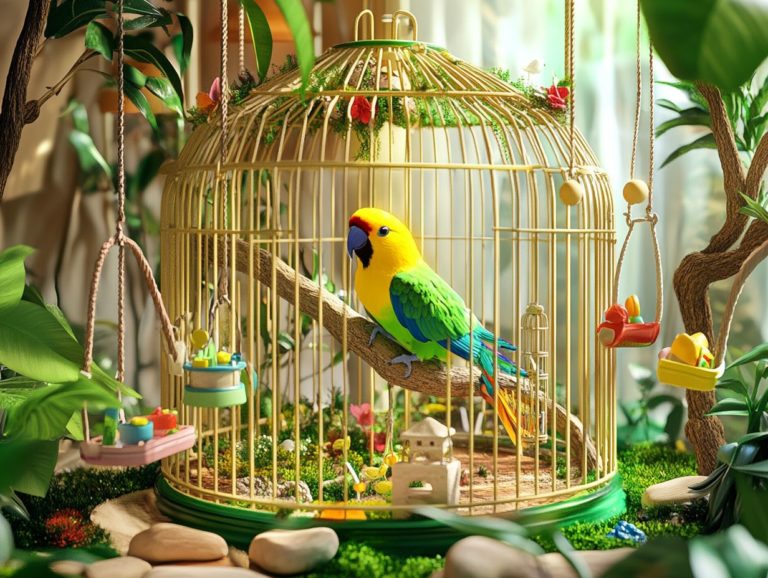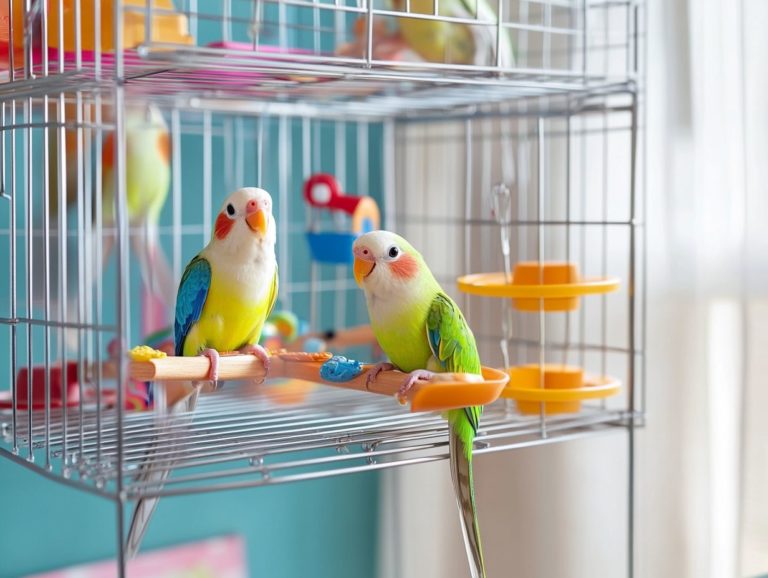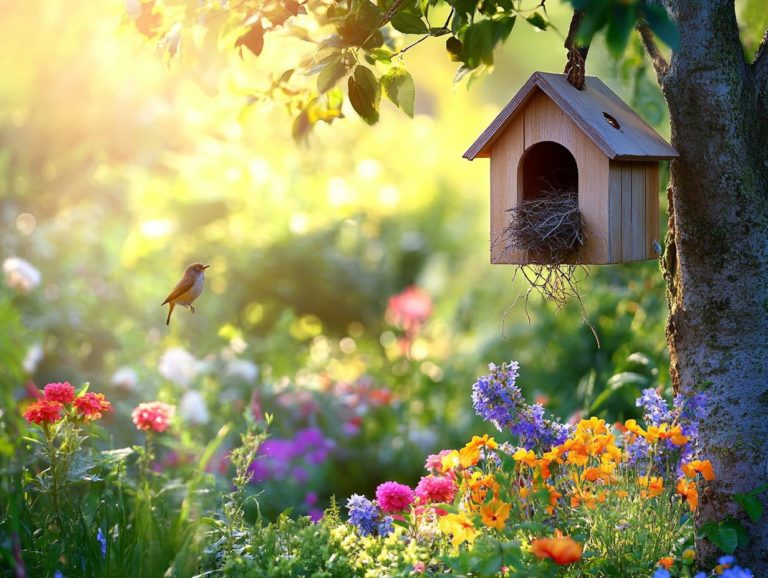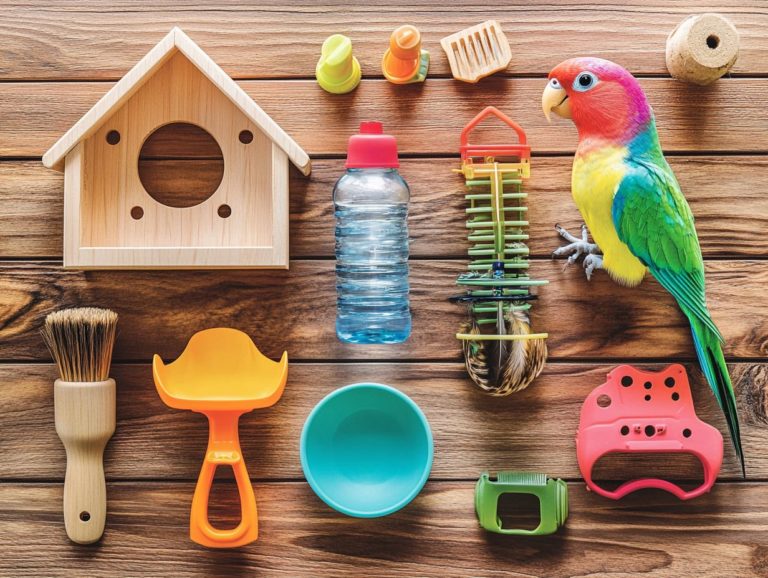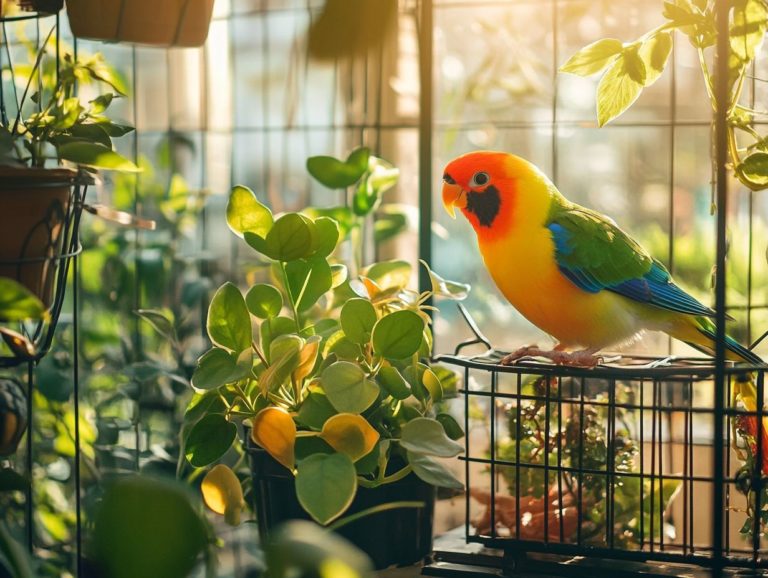How to Choose the Right Location for a Cage
Choosing the right location for your pet’s cage is essential for their bird well-being and happiness.
Whether you’re contemplating an indoor or outdoor setup, several factors demand your attention, including the cage size, type of cage, environmental conditions, and kitchen safety considerations.
This guide will walk you through the best locations for both indoor and outdoor cages, highlighting the benefits and risks associated with each option. You’ll also find vital preparation steps to ensure a comfortable environment and secure space for your furry companion.
Dive into these insightful tips to simplify your decision-making process and create the perfect habitat for your pet!
Contents
- Key Takeaways:
- Factors to Consider Before Choosing a Cage Location
- Indoor Cage Location Options
- Outdoor Cage Location Options
- How to Prepare the Chosen Location for a Cage
- Final Tips for Choosing the Right Cage Location
- Frequently Asked Questions
- 1. What factors should I consider when choosing the right location for a cage?
- 2. Can I place my cage anywhere in the house?
- 3. Is it okay to place my cage near a window?
- 4. Should I consider the size of the cage when choosing a location?
- 5. Can I place my cage in a room with other pets?
- 6. What if I don’t have a suitable location for my cage indoors?
Key Takeaways:

- Choose a cage placement based on the cage size and type, as well as environmental factors like temperature changes and noise levels.
- For indoor cages, the best locations are quiet, well-ventilated areas away from direct sunlight and drafts.
- Outdoor cages can provide benefits like fresh air and natural sunlight, but also come with risks such as exposure to predators and adverse weather conditions, so careful preparation is necessary.
Factors to Consider Before Choosing a Cage Location
Selecting the perfect cage location for your feathered companions is very important for their well-being and happiness. Considerations such as cage size, opportunities for social interaction, and environmental conditions are key to your birds’ overall health.
This is especially true for species like parrots, which thrive in settings rich in social engagement and natural light. The ideal spot must be free from drafts and should provide a cozy atmosphere, facilitating interaction with family members and other pets.
Size and Type of Cage
The size and type of cage are vital elements in crafting a healthy environment for your birds, especially for larger species like parrots that need ample space to move and interact.
Choosing the right cage isn t just about dimensions; it s about thoughtful design that caters to the unique needs of each species. For example, bar spacing plays a critical role, keeping smaller birds secure while ensuring larger ones don t injure themselves. A well-designed cage should feature horizontal bars that promote climbing and playing, encouraging exercise and mental stimulation.
By providing a variety of perches and toys that align with your bird s natural behaviors, you can significantly enhance their overall well-being. It’s crucial for any bird owner to carefully weigh these factors when creating a welcome home for their feathered companions.
Environmental Factors
Environmental factors such as cage placement, natural lighting, and cleaning considerations play a pivotal role in shaping the health of your birds and their living conditions.
These elements combine to create an optimal habitat that fosters both their physical and mental health. For instance, ensuring your birds receive ample natural light is essential, as it directly affects their natural body clock and overall mood. Temperature fluctuations can lead to unnecessary stress; thus, maintaining a stable environment is crucial.
Regular cleaning not only prevents the accumulation of harmful bacteria but also instills a sense of security, allowing your feathered companions to thrive. By being attentive to these factors, you can significantly enhance the quality of life for your birds.
Indoor Cage Location Options

Choosing the perfect spot for your feathered companions’ indoor cage is crucial for their well-being and joy. It requires a thoughtful approach to find a location that balances safety with accessibility.
Look for areas sheltered from drafts, away from high-traffic zones, and clear of kitchen hazards, all while ensuring your birds enjoy plenty of interaction with family members. Your careful selection will contribute significantly to their happiness and health!
Start creating the perfect home for your birds today!
Best Places in the House
The ideal spots in your home for bird cages are those that create a stable environment, crucial for your bird’s health. They should also invite interaction with family while steering clear of potential hazards like lead and zinc.
Select locations away from drafts, heating vents, and direct sunlight. This ensures your feathered friend remains comfortable and safe. Placing the cage near family gathering areas, like the living room, fosters socialization, which is vital for the bird s emotional well-being.
Choose cages with strong locks to prevent any unexpected escapes. When cleaning, opt for products that are free from harmful chemicals. This ensures a safe environment for your avian companions.
By considering these factors, you can create a harmonious and protective sanctuary for your birds.
Outdoor Cage Location Options
Exploring outdoor cage location options presents a wonderful opportunity for your birds to bask in fresh air and natural sunlight. This enhances their overall health and well-being. However, it’s essential to weigh the potential risks and ensure a safe and nurturing environment for your feathered companions.
Benefits and Risks of Outdoor Cages
Outdoor cages offer numerous advantages, including enhanced airflow and exposure to enriching natural stimuli. However, they also carry potential risks that could negatively impact bird health if not carefully managed.
These enclosures allow your avian companions to soak up sunlight and engage with the sights and sounds of nature. This significantly reduces stress and promotes their overall well-being. Stay vigilant! Your birds depend on you to keep them safe from outdoor dangers like predators and extreme weather conditions.
The significance of a strong lock cannot be overstated; it acts as the first line of defense against unwanted escapes or intrusions. Observe your birds closely to monitor their behavior, ensuring they remain safe, well-fed, and comfortable in their surroundings. This vigilant approach fosters a thriving habitat for these magnificent creatures.
How to Prepare the Chosen Location for a Cage
Preparing the selected location for your bird’s cage is essential for creating a comfortable environment that fosters their well-being. This process demands careful attention to cleaning considerations and safety features, such as strong locks, to ensure your feathered friend feels safe and at home.
Cleaning and Safety Precautions
Implementing effective cleaning and safety precautions is essential for maintaining a healthy environment for your birds, especially in areas close to the kitchen or other high-risk zones.
Your top priority should be ensuring that your feathered friends are shielded from potential hazards, such as fumes from cooking or cleaning products that can be dangerous for birds. Regularly sanitizing the cage not only removes waste but also reduces the risk of bacterial growth. It’s vital to choose bird-safe cleaning products, as many common household cleaners can pose serious risks.
Creating optimal airflow while avoiding drafts is key to regulating temperature and maintaining excellent air quality. Both are crucial for the delicate respiratory systems of birds. By keeping their living space clean and safe, you foster their well-being and contribute to a vibrant, joyful home.
Final Tips for Choosing the Right Cage Location
When selecting the perfect cage location for your birds, prioritizing their health and happiness is essential. Consider these final tips to help you make an informed decision that leads you to the ideal spot for your feathered friends. Make your choice today for a happier, healthier bird!
Additional Considerations
When considering cage placement, keep the specific needs of different bird species in mind. Natural lighting and social interaction are key factors.
Parrots flourish in bright, well-lit areas. In contrast, finches prefer more subdued lighting. Understanding these varied preferences enhances the birds’ well-being and improves their environment.
Social dynamics are very important; some birds need to interact with others, or they may feel lonely. Position social birds near their companions while solitary species may thrive in more secluded spots.
Frequently Asked Questions
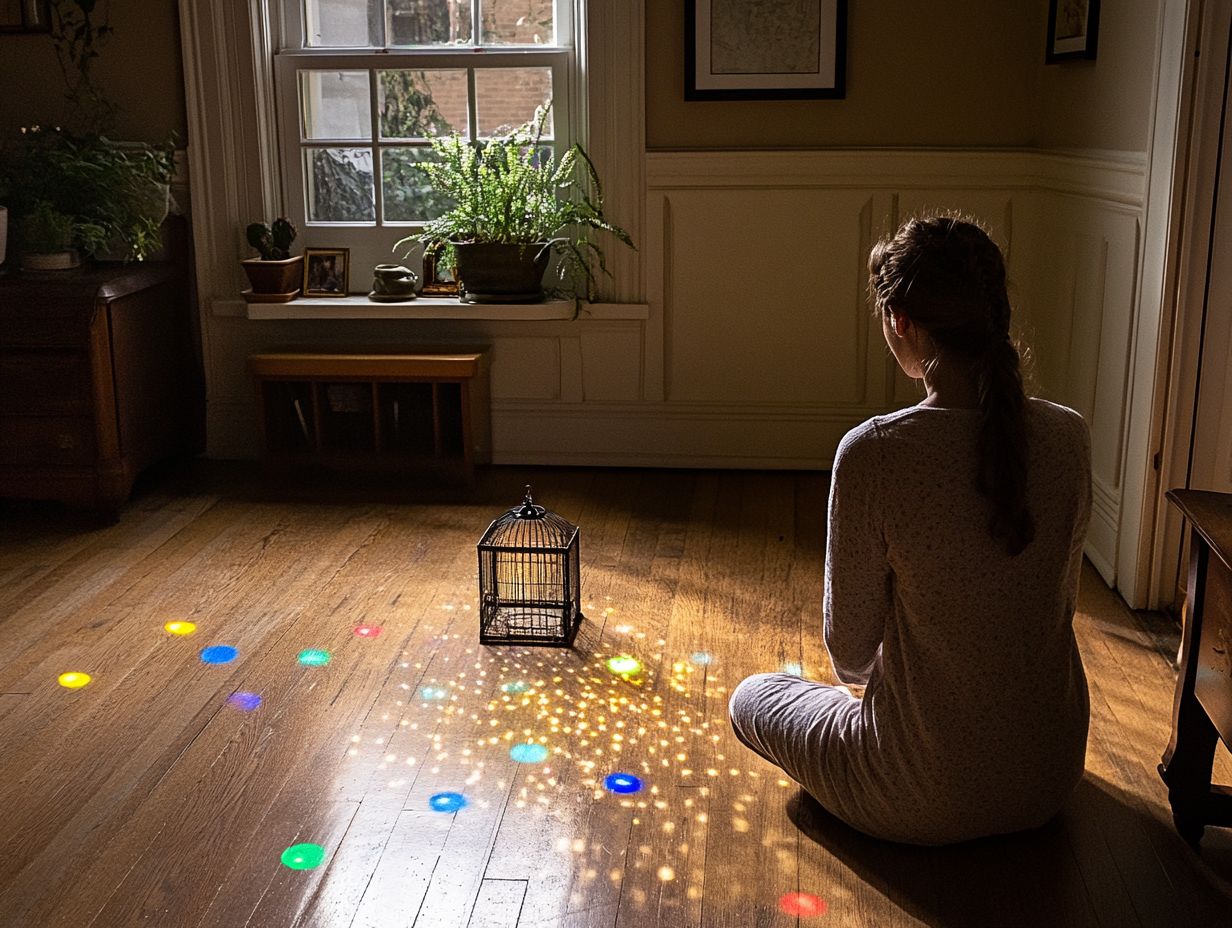
1. What factors should I consider when choosing the right location for a cage?
When choosing the perfect location for your cage, consider temperature, natural light, noise levels, and accessibility. Understanding the importance of cage location for birds will help ensure the comfort and well-being of your pet.
2. Can I place my cage anywhere in the house?
No, it is important to choose a suitable location for your cage. Avoid areas with extreme temperatures, direct sunlight, or high noise levels. Keep it away from heavy foot traffic to minimize stress for your pet.
3. Is it okay to place my cage near a window?
Yes, placing your cage near a window can provide natural light for your pet, which is beneficial for their health. However, avoid direct sunlight to prevent overheating and discomfort.
4. Should I consider the size of the cage when choosing a location?
Yes, consider the size of the cage when choosing a location. Ensure there is enough space for your pet to move comfortably and for easy access during cleaning and maintenance.
5. Can I place my cage in a room with other pets?
It is not recommended to place your cage in a room with other pets, as this can cause stress and potential harm. Keep them in separate areas to ensure the safety and comfort of your pet.
6. What if I don’t have a suitable location for my cage indoors?
If you don’t have a suitable location indoors, consider placing the cage in a safe and secure outdoor area. Ensure there is enough shelter and protection from extreme weather for your pet’s well-being.


